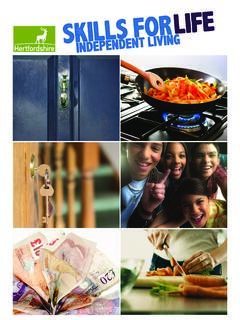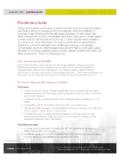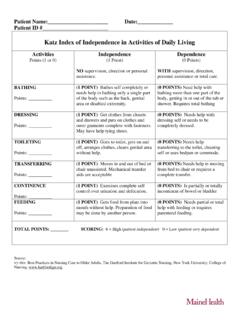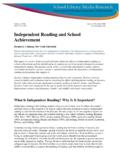Transcription of CHILDREN'S ADMINISTRATION DIVISION OF CHILDREN AND …
1 Page 1 of 9 LIFE SKILLS INVENTORY DSHS 10-267 (12/2000) CHILDREN 'S ADMINISTRATION DIVISION OF CHILDREN AND FAMILY SERVICES LIFE SKILLS INVENTORY independent living SKILLS ASSESSMENT TOOL INSTRUCTIONS In order to accurately complete the IL assessment, please involve the youth, the CHILDREN 's ADMINISTRATION social worker, the foster parent or relative caregiver, and any other persons knowledgeable about the skills of the youth. ??Scoring should be based on the lowest level of completion. The level of attainment for each youth completing this assessment is the lowest level where they satisfactorily complete the required number of questions. Youth may be highly competent in some areas, but have limited basic knowledge in others. Having basic knowledge in each area is important for long term success, and plan development should be focused on filling gaps in youth knowledge.
2 ??Completing Category O It is important for all youth to have a basic knowledge of options for pregnancy prevention. It is not the goal for all youth to reach Exceptional in this category, unless the youth (either male or female) is or will shortly be in a parenting role. Abuse and neglect issues are not specifically assessed, but competence at the "Intermediate" level should help youth avoid CPS complaints. ??Time frames for completion All youth should be assessed at age 15 to 16. Once you have completed the IL assessment on a youth you do not need to repeat the assessment. All further reporting will be based on the goals of the youth, and their skill level will be indicated by the progress achieved in attaining goals. If the youth remains on the same goal, the skill level doesn t change. COVER SHEET NAME OF YOUTH: CAMIS PERSON ID: DATE OF BIRTH: PERSON(S) INVOLVED IN LIFE SKILLS ASSESSMENT AND DATES OF ASSESSMENT DATE CATEGORY DATE SKILL ATTAINED BASIC INT.
3 ADV. EXCEL A Money Management/Consumer Awareness B Food Management C Personal Appearance and Hygiene D Health E Housekeeping F Housing G Transportation H Educational Planning I Job Seeking Skills J Job Maintenance Skills K Emergency and Safety Skills L Knowledge of Community Resources M Interpersonal Skills N Legal Skills O Pregnancy Prevention/Parenting and Child Care Page 2 of 9 LIFE SKILLS INVENTORY DSHS 10-267 (12/2000) Category A: Money Management and Consumer Awareness Basic - Must know 3 of 5 to advance to the next level of accomplishment: Knows values of coins and currency.
4 Can make a transaction at a local store and count change. Has an understanding of the difference between luxuries and necessities in food, transportation, clothing, housing. Understands the difference between sale price and regular price . Can identify one way to save money on purchases. Intermediate - Must know 4 of 6 to advance to the next level of accomplishment: Can open a checking or savings account. Can write checks/make withdrawals and make deposits. Can record banking transactions (either checking or savings). Can budget allowance to last for a week. (Shows some understanding of the concept of saving). Understands the difference between gross wage and take home pay. Can use a calculator to add, subtract, divide and multiply. Advanced - Must know 4 of 6 to advance to the next level of accomplishment: With assistance can make out monthly budget covering regular expenses for independent living .
5 Shows some sales resistance to something for nothing advertising and low weekly payment credit plans. Can read monthly bank statements, compare balances, make adjustments as necessary (deduct service charges, check fees, adjust for differences in the balance). Can comparison shop using unit pricing information. Understands the responsibility of filing tax forms. Knows the information that is required for filing taxes and knows where to go to get assistance in filing taxes. Knows how to clip and use coupons. Exceptional - Must know at least 3 to be rated as exceptional: Budgets for unanticipated emergencies, seasonal bills, etc. Understands buying on credit, loans, interest, and late payment penalties. Understands payroll deductions, taxes, FICA, insurance. Can complete a short tax form. Can balance a checkbook.
6 Has regular savings program. Category B: Food Management Basic - Must know at least 3 of 4: Washes hands before eating and preparing food. Can order in a cafeteria or fast food restaurant. Can describe food pyramid and foods that contribute to a healthy life style. Knows name and use of cooking utensils. Intermediate - Must be able to do 5 of 8: Can order a meal from the menu in a restaurant Can fix a breakfast for one Can fix a lunch for one Can fix a dinner for one Can make out a grocery shopping list Can use cooking utensils effectively and safely (knives, grater, can opener, potato peeler, egg beater, etc.) Can use kitchen appliances effectively and safely Can use acceptable table manners Advanced - Must know 5 out of 7: Stores perishable items under refrigeration. Recognizes signs of spoilage in food.
7 Can follow the instructions for preparing canned or frozen foods. Can plan weekly menu of nutritious meals. Can shop for a week s menu and stay within a food budget. Can set the table properly. Can carry out a grocery-shopping trip (selecting items on the shopping list and paying the cashier). Exceptional - Must know at least 3: Prepares recipes from a cookbook. Can adjust recipes to feed more or less people than called for in the recipes. Understands how to use dates on food packages to prevent spoilage. (see next page) Page 3 of 9 LIFE SKILLS INVENTORY DSHS 10-267 (12/2000) Category B: Food Management (continued) Exceptional - Must know at least 3: (continued) Prepares and eats a balanced diet. Understands and can use unit pricing to comparison shop. Category C: Personal Appearance and Hygiene Basic - Must be able to do 4 of 4: Can dress self (including underwear, socks, and tied shoes) in a reasonably acceptable fashion.
8 Can bathe self. Knows how to use soap, shampoo, deodorant, shaving cream, other common personal products appropriate to sex. Brushes teeth regularly. Intermediate - Must be able to do 3 of 3: Showers or bathes regularly. Keeps hair clean and neat. Dresses in reasonably clean clothing. Advanced - Must be able to do 4 of 6: Can read clothing labels and determine which clothes are to be dry cleaned, hand washed, and machine-washed. Can sort and machine-wash clothes at a Laundromat using appropriate temperatures, amounts of soap, bleach, etc. Can dry clothes in a dryer using appropriate settings. Knows the cost of and can budget money for special hair and nail care ( , permanents, braiding, manicures, etc.). Can iron clothes. Can sew on buttons and make minor clothing repairs. Exceptional - Must know at least 2: Can hand wash items following the instructions on the label.
9 Knows appropriate clothing to wear for almost all occasions. Knows approximate cost of dry cleaning and can arrange for dry cleaning. Category D: Health Basic - Must know 5 of 6: Can open childproof container. Knows not to take someone else s medication. Knows that drugs, alcohol, and tobacco may be harmful to your health. Knows parts of the body and sexual functioning. Knows how pregnancy occurs. Knows how and where to get emergency health care. Intermediate - Must know 3 of 4: Can recognize and describe symptoms of colds, flu, and other common health problems. Knows what to do for a minor cut, a minor burn, a splinter. Understands the risks of pregnancy and sexually transmitted diseases. Understands the risks of drug and alcohol abuse. Advanced - Must know 9 of 13: Can take own temperature using an oral thermometer.
10 Can nurse self through cold or flu. Recognizes/makes correct use of over the counter drugs for pain, stomach upset, diarrhea, fever, cold/allergy. Can call a doctor or dentist and schedule an appointment. Can read a prescription label correctly and follow the instructions. Can take medication without supervision. Knows how to dispose of drugs in a safe manner. Knows how to use what is included in a First Aid Kit. Knows how to obtain a copy of personal immunization records and medical history. Knows methods of birth control and how to obtain birth control devices. Knows how to prevent the spread of sexually transmitted diseases. Has selected a doctor, dentist or clinic for regular health care. Understands the importance of medical insurance. Exceptional - Must know at least 2: Is conscious of diet, exercise, good eating habits, and other preventative health measures.






